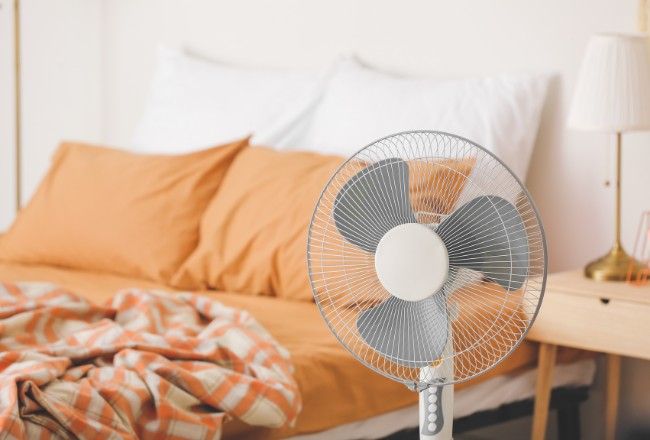Most people assume that a warm and cosy bedroom is the key to a good night’s sleep. However, research suggests otherwise—sleeping in a cool environment may actually improve sleep quality, support metabolism, and even slow aging!
Your body naturally cools down as you prepare for sleep, and maintaining a colder room temperature helps regulate this process.
In this guide, we’ll explore the top benefits of sleeping in a cold room, along with some potential downsides, so you can create the perfect sleep environment.
7 Benefits of Sleeping in a Cold Room
The top benefit of sleeping in a cold room is that it improves your sleep quality, by helping you fall asleep faster and deeper.
This and a few other benefits we’ll discuss below are all good reasons for you lower the temperature in your bedroom, starting from tonight!
1. Fall asleep faster
A cooler environment signals your body to release melatonin, the sleep hormone responsible for regulating your sleep-wake cycle.
According to sleep experts, the ideal bedroom temperature for optimal sleep is between 15-20°C (60-67°F).
This natural drop in body temperature encourages drowsiness, making it easier to fall asleep faster and stay asleep longer.
Tip: Read our guide on 3 Benefits of Reading Before Bedtime, one of which is that it helps you fall asleep quicker.
2. Improves sleep quality

Sleeping in a cold room promotes better sleep by facilitating the body’s natural temperature drop during the night.
This encourages deeper and more restorative sleep cycles, without you having to wake up in the middle of the night.
This will leave you feeling refreshed and rested in the morning.
3. Helps you burn calories
Cold exposure can stimulate the activation of brown fat, a type of fat that burns calories to generate heat.
Research published on the National Library of Medicine found that sleeping in a 19°C (66°F) room increased brown fat activity in participants, helping them burn more calories overnight.
Over time, this may support a healthy metabolism and even aid in weight management.
4. Prevents insomnia
Insomnia may be caused by an organ dysfunction, but it can also be caused by continuous exposure to anxiety and stress. Studies suggest that individuals experiencing insomnia tend to have a higher body temperature compared to those who don’t.
Cooling down the body temperature by sleeping in a cold room can help you fall asleep faster and eventually alleviate insomnia.
5. Reduces night sweats
Cold rooms alleviate issues of excessive sweating during the night, preventing discomfort and disturbances. Maintaining a cooler temperature supports a dry and comfortable sleep environment.
Shopping tip: If your mattress causes you to overheat at night and feel too hot, check out our review of the iGel mattress collection by Bensons for Beds. It has a layer of iGel, which helps you maintain an optimal body temperature throughout the night, without feeling too hot or too cold.
6. Anti-aging benefits
Cooler temperatures stimulate the production of melatonin, a powerful antioxidant that protects against cellular damage and aging.
Additionally, deep sleep is crucial for collagen production, which helps maintain firm, youthful skin.
By improving sleep quality, a cold room supports overnight skin repair, reducing wrinkles and promoting a glowing complexion.
7. Improves your mood
Studies have shown that a cooler sleeping environment can help improve mood, as it promotes deeper and more restful sleep. As we already explained above, when you sleep in a cooler room, your body’s core temperature drops.
As a result this triggers the release of melatonin, the hormone that regulates sleep. This can result in a more restful sleep, which can help reduce stress levels and improve mood.

How to make your bedroom colder?
Now that you know all the benefits of sleeping in a cold room, let’s discuss some ways you can make your bedroom cooler.
This is especially useful for the hot summer months and in periods when there is a heatwave, as temperatures can reach around 25-30 C during the day and 20-25 C during the night.
1. Keep the curtains and blinds closed during the day
Sunlight entering your bedroom through windows can create a greenhouse effect, significantly raising indoor temperatures.
Keeping curtains or blinds closed during the hottest parts of the day helps block heat from entering.
If your bedroom faces south and receives a lot of sunlight, consider using thermal blackout curtains or reflective window films to keep your room cool without compromising natural light entirely.
2. Use a fan or air conditioner
A fan is a cost-effective way to lower the temperature and improve airflow in your bedroom. For an extra cooling effect, try placing a bowl of ice or a damp towel in front of the fan—as the air passes over the ice, it cools down and circulates throughout the room.
If you have an air conditioner, set it to 16-19°C (61-66°F) for optimal sleep. To improve energy efficiency, close doors and windows to keep the cool air inside and use a programmable thermostat to prevent overcooling.

3. Change your bedding
If you find that you’re tossing and turning at night because your bedding is too warm, then consider changing it. Make sure you have a lightweight and breathable duvet or blanket, made from natural materials like cotton, linen or even bamboo.
These materials are lightweight and breathable, and will not retain heat. This way you won’t overheat or sweat at night.
Dangers of sleeping in a cold room
Make sure the temperature in your bedroom is not lower than 13 degrees Celsius, which is considered too cold and may be dangerous to your health.
If you’re sleeping in a room that is too cold for an extended period of time, it can increase your risk of developing certain health problems:
- Stiff Muscles and Joints: Cold temperatures can contribute to muscle and joint stiffness. If your room is too cold, you may wake up with tense muscles, making it difficult to start your day and perform your daily tasks.

- Decreased Immune Function: Prolonged exposure to cold environments might weaken your immune system, making you more susceptible to illnesses. Adequate warmth is essential for maintaining the body’s immune response.
- Increased Stress on the Heart: Cold temperatures can lead to vasoconstriction, a narrowing of blood vessels, which may increase blood pressure and put extra strain on the heart. This can be particularly concerning for individuals with existing cardiovascular conditions.



